Ted Drake
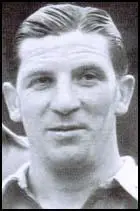
Edward (Ted) Drake was born in Southampton on 16th August 1912. After leaving school he worked as gas-meter reader.
A talented footballer he played for Southampton Gasworks and Winchester City before joining Southampton. He scored a hat-trick on his debut against Swansea Town on 14th November 1931.
In the 1932-33 season Drake scored 20 goals in 33 games. Herbert Chapman, the manager of Arsenal, tried to sign Drake but he rejected a move to London as he was happy playing for George Kay. The following season Drake was the Second Division's top goalscorer.
George Allison, the new manager of Arsenal, made another attempt to sign Drake in March 1934. Southampton had financial problems at the time and agreed a fee of £6,500 for their star centre-forward. While at the club he had scored 48 goals in 74 appearances.
Drake scored a goal on his debut for Arsenal against Wolverhampton Wanderers on 24th March, 1934. Arsenal won the First Division league championship that season but Drake joined too late to qualify for a medal.
Ted Drake scored 42 goals in 41 games in the 1934-35 season. This included three hat-tricks against Liverpool, Tottenham Hotspur and Leicester City and four, four-goal hauls, against Birmingham City, Chelsea, Wolves and Middlesbrough. These goals helped Arsenal to win the league championship.
Drake won his first international cap for England against Italy on 14th November 1934. The England team that day also included Eddie Hapgood, Ray Bowden, Wilf Copping, Cliff Bastin, George Male, Frank Moss, Stanley Matthews and Eric Brook. Drake scored one of the goals in England's 3-2 victory.
The following season Drake played in England's 2-1 victory over Northern Ireland. Drake had a particularly good game against Aston Villa on 14th December, 1935. He was suffering from a knee injury but George Allison decided to risk him. By half-time he had scored a hat-trick. Drake scored three more in the first 15 minutes of the second-half. Drake then hit the bar and when he told the referee it had crossed the line, he replied: "Don't be greedy, isn't six enough". In the last minute he converted a cross from Cliff Bastin. Seven goals in an away game was an amazing achievement.
Drake returned to the England team against Wales on 5th February 1936. He failed to score and was replaced by George Camsell in the next game against Scotland. Freddie Steele also played in this position until Drake regained his place in the game against Hungary on 2nd December 1936. Drake rewarded the selectors with a hat-trick in the 6-2 victory.
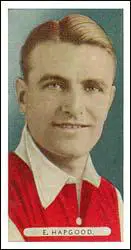
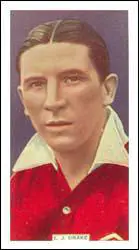
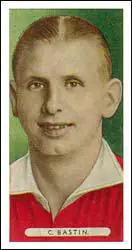
However, a serious knee injury, that needed a cartilage operation, put Drake out of action for ten weeks. Arsenal missed his goals and only finished in 6th place behind Sunderland. Arsenal did much better in the FA Cup that season. Arsenal beat Liverpool (2-0), Newcastle United (3-0), Barnsley (4-1) and Grimsby Town (1-0) to reach the final against Sheffield United.
As Eddie Hapgood pointed out: The match will go down in history as Ted Drake's Final. Badly injured in the Welsh match at Wolverhampton three months before (when, incidentally, Arsenal had six men chosen), Ted was gambled on at Wembley. And the gamble came off. Wearing the world's biggest bandage on his left knee, Ted got the only goal of the match sixteen minutes from time. He told us in the dressing-room that when he received Cliff Bastin's pass, he knew it was now or never. And that when he hit the ball he knew it was a goal."
Some of Arsenal's key players such as Alex James, Cliff Bastin, Joe Hume, Ray John and Herbert Roberts were past their best. Drake and Ray Bowden continued to suffer from injuries, whereas Frank Moss was forced to retire from the game with a shoulder injury. Given these problems Arsenal did well to finish in 3rd place in the 1936-37 season.
Before the start of the 1937-38 season Herbert Roberts, Ray John and Alex James retired from football. Joe Hume was out with a long-term back injury and Ray Bowden was sold to Newcastle United. However, a new group of younger players such as Bernard Joy, Alf Kirchen and Leslie Compton, became regulars in the side. George Hunt was also bought from Tottenham Hotspur to provide cover for Ted Drake who was still suffering from a knee injury. Cliff Bastin and George Male were now the only survivors of the team managed by Herbert Chapman.
Wolves were expected to be Arsenal's main rivals in the 1937-38 season. However, it was Brentford who led the table in February. They also beat Arsenal on 18th April, a game in which Ted Drake broke his wrist and suffered a bad head wound. However, it was the only two points they won during a eight game period and gradually dropped out of contention.
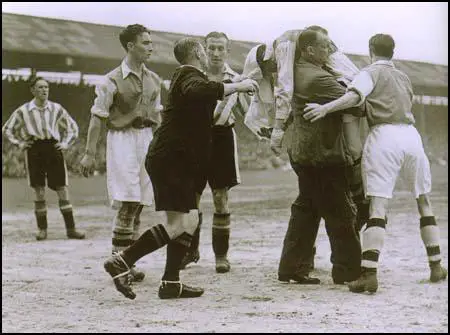
On the last day of the season Wolves were away to Sunderland. If Wolves won the game they would be champions, but they drew 1-1. Arsenal beat Bolton Wanderers at Highbury and won their fifth title in eight years. As a result of his many injuries, Ted Drake only played in 28 games but he still ended up the club's top scorer with 17 goals.
Jeff Harris, the author of Arsenal Who's Who argues that "Drake's main attributes were his powerful dashing runs, his great strength combined with terrific speed and a powerful shot. Ted Drake was also brilliant in the air but above all, so unbelievably fearless."
Stan Mortensen considered Drake a better centre-forward than Tommy Lawton: "I came to regard him as my ideal centre-forward... Drake was absolutely fearless. I do not mean that he threw his weight about to hurt other players. He would risk physical injury to himself if he could see half a chance - no, one tenth of a chance - to get through to score.... I am afraid his method similarly took toll of his frame. But he never eased up, and was completely unselfish, always on the look-out for a chance to make an opening for the inside-forwards.
Drake also scored two of the goals in England's 4-2 victory over France on 26th May 1938. Stanley Matthews, who played for England that day later recalled: "Ted Drake turned in a masterful performance. He hurled himself around in the French penalty area, his robust, barnstorming style always a source of trouble to France, and he ended the game with two goals to his name. We ran out comfortable 4-2 winners with our other goals coming from Frank Broome and Cliff Bastin." Drake had scored six goals in five games but it was the last time he played for his country.
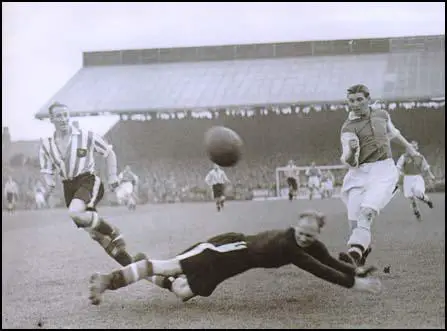
The outbreak of the Second World War brought a halt to Ted Drake's Arsenal career. Despite his many injuries he was Arsenal's leading league goalscorer in each of his five seasons at the club.
Drake served in the Royal Air Force during the war and managed to score 86 goals in 128 friendly games for Arsenal. In a game against Reading in 1945 Drake suffered a serious spinal injury and was forced to retire from the game. During his first-class football career he had scored 171 goals in 238 appearances.
Drake became manager of Reading in 1947. At the time the club was playing in the Third Division and in the 1951-52 season the club finished in second place in the league. As a result of this Drake was appointed manager of Chelsea. The club won the First Division championship in the 1954-55 season. In doing so, he became the first person to win the league title both as player and manager. Unfortunately the team went into decline and Drake was sacked in 1962.
Ted Drake died on 30th May 1995.
Primary Sources
(1) Eddie Hapgood, Football Ambassador (1945)
The match will go down in history as Ted Drake's Final. Badly injured in the Welsh match at Wolverhampton three months before (when, incidentally, Arsenal had six men chosen), Ted was gambled on at Wembley. And the gamble came off. Wearing the world's biggest bandage on his left knee, Ted got the only goal of the match sixteen minutes from time. He told us in the dressing-room that when he received Cliff Bastin's pass, he knew it was now or never. And that when he hit the ball he knew it was a goal.
(2) Stanley Matthews, The Way It Was (2000)
Ted Drake was a big man with a big heart and he was prolific in front of goal. In 1935, he had scored all seven goals for Arsenal in a 7-1 win at Aston Villa, the most amazing thing being, he had only eight chances in the whole of that game and had put all but one of them away - the other chance hit the crossbar! It spoke volumes for his ability. The word profligacy didn't feature in his vocabulary. Ted's seven-goal haul at Aston Villa ensured his name will live long in football history, but goals apart, he turned in many better performances and the game against France was one of them.
The pressure was on England to bounce back against a French team considered to be far and away a better side than Switzerland. I relished the big-match atmosphere and as soon as the game got under way I knew I was on for the palmiest of days. Everything I did came off and my England colleagues, having shaken off the lackadaisical attitude so evident against the Swiss, set about the French with vigour. Ted Drake turned in a masterful performance. He hurled himself around in the French penalty area, his robust, barnstorming style always a source of trouble to France, and he ended the game with two goals to his name. We ran out comfortable 4-2 winners with our other goals coming from Frank Broome and Cliff Bastin.
(3) Stan Mortensen, Football is My Game (1949)
When I played alongside Drake during the war years I came to regard him as my ideal centre-forward... Drake was absolutely fearless. I do not mean that he threw his weight about to hurt other players. He would risk physical injury to himself if he could see half a chance - no, one tenth of a chance - to get through to score. He was one of those players who strip bigger than they look in their street clothes, and he made the full use of every ounce of weight he possessed.
Like his team-mate, Alf Kirchen, Ted did not spare himself once the game warmed up; and I am afraid his method similarly took toll of his frame. But he never eased up, and was completely unselfish, always on the look-out for a chance to make an opening for the inside-forwards.
There have been many centre-forwards, international players, too, with fewer qualities, but none with more. I would never expect more from any team-mate than Ted Drake gave in those war-time representative contests when, near the end of his grand career, he never gave a thought to the idea of conserving his energies with a view to playing just a little longer. No, it was all out, all the time, for Ted.

